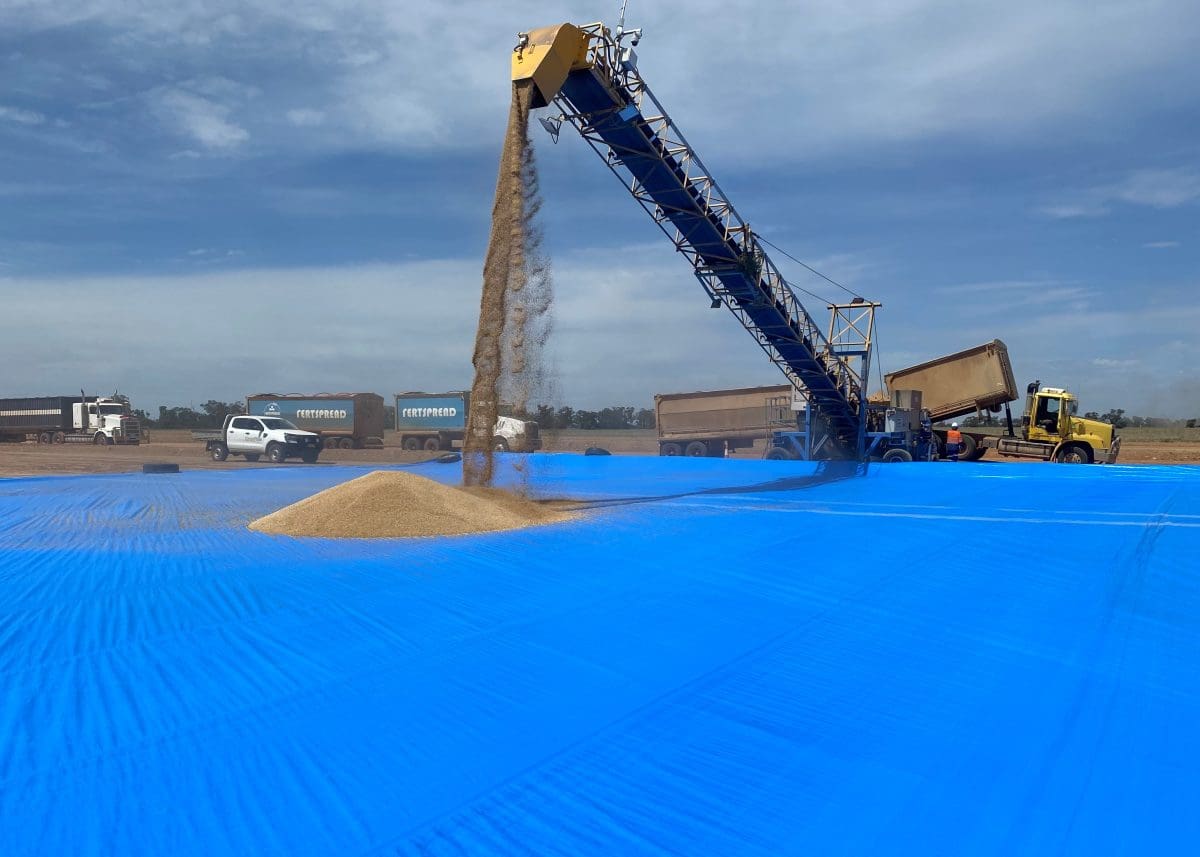
Grain goes into a new bunker at GrainFlow’s Nyngan site in NSW this harvest. Photo: Cargill Australia
AUSTRALIAN grain-industry leaders are keeping a close eye on potential disruptions to domestic and export supply chain as a wave of Omicron infections sweeps across eastern States.
Impacts to Australian grain supply chains appear to have been relatively minimal to date, with one exception surrounding the disruptions being caused to the operations of one of Australia’s largest buyers of grain, the Ingham’s Group.
The company, which feeds up to 50 million chickens on hundreds of farms around Australia, said in a statement to the ASX that the rapid spread of the Omicron variant is now having a significant impact on its operations, logistics and sales performance, and also those of some of its suppliers and customers.
All the company’s major Australian sites are still operational and have not experienced significant on-site transmission of COVID, the company said in a statement to the ASX last week.
However, they are currently experiencing significantly lower levels of staff availability, which was impacting production volumes and operational efficiency.
“Following the COVID issues we faced in calendar 2021, the recent Omicron surge in Australia has presented unprecedented challenges to Ingham’s Australian business, with many Ingham’s employees being forced to isolate at home due to contracting in the COVID in the community or as a result of being close contacts,” Ingham’s CEO and managing director Andrew Reeves said.
“We are currently maintaining our Australian processing operations while seeking to ensure the safety and engagement of our employees, many of who are demonstrating outstanding levels of commitment to work through the current challenges.
“The operational and trading difficulties have resulted in significant operational inefficiency, additional costs and the temporary suspension of a number of Ingham’s products. Ingham’s is working closely with our customers and we are focused on supplying as much product as possible to customers while the current disruption continues.”
The announcements by the Federal and State Governments on changes to isolation rules for close contacts in the food sector were expected to assist to alleviate some of the staff shortages, Mr Reeves said.
“As operating conditions begin to stabilise, we expect our production capacity to recover relatively quickly to meet customer and consumer demand.”
Grain Producers Australia CEO Colin Bettles told Grain Central that the national grower representative organisation has been monitoring conditions but so far there have no significant disruptions evident to the harvest or supply of grain to customers.
“We have been keeping an eye on the supply chain logistics such as the trucks and trains and workers required to get grain from wherever it has been stored up country to ports but there have been no major issues as far as we are aware,” he said.
“We’re not aware of any impact in terms of domestic flour millers or in the supply of feed grain.
“It’s one of the biggest ever Australian grain crops and the global logistics supply chain is a bit strained, so sea containers have been an issue and the cost has gone up which has been another matter.
“Certainly the pinch points in the supply chain at port will be tested in terms of individual traders wanting to get grain volumes out to optimise value, but as long as it can continue functioning in a fair and transparent manner, there’ll be no reason to be alarmed.”
Earlier this month GrainCorp acted quickly to shut down claims via a tweet suggesting it had been forced to close its Naracoorte receival site in South Australia due to staff members testing positive to COVID.
“We’d just like to clarify that actually the site is currently closed due to inclement weather, not because of any COVID cases! We will re-open once deliveries get up and running,” GrainCorp responded via its Twitter account.
Corporate Affairs Manager Jess Simons told Grain Central that GrainCorp has had some staff members test positive or as close contacts, and, like many other businesses, is dealing with staff who need to isolate in various locations.
 “We’re certainly not immune to the challenges of the pandemic but we’ve managed fairly minimal disruptions to our supply chain through segregating staff and providing a contactless delivery process, cleaning programs and the use of RAT kits,” she said.
“We’re certainly not immune to the challenges of the pandemic but we’ve managed fairly minimal disruptions to our supply chain through segregating staff and providing a contactless delivery process, cleaning programs and the use of RAT kits,” she said.
“At this stage, we have an adequate supply of RAT kits for staff to ensure we can continue to comply with all of the Government requirements to get staff safely back on site.”
She confirmed that the Naracoorte situation was nothing more than a rumour: “We were closed because of the inclement weather forecast, not due to COVID.”
GrainCorp chief executive Robert Spurway told the Sydney Morning Herald in November last year that the company had managed to avoid the supply chain issues that had impacted many other businesses because more than 95 percent of its goods are delivered in bulk, meaning they do not require shipping containers, which are in short supply and the cause of major congestion and delays.
If you are aware of ways in which the COVID pandemic is causing disruptions to the Australian grain sector let us know either in the comments section below or email [email protected]



HAVE YOUR SAY